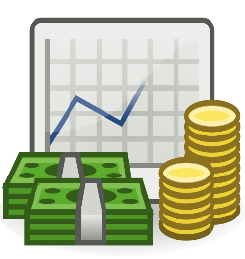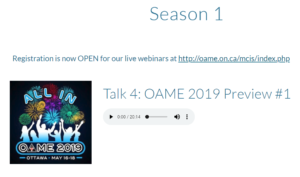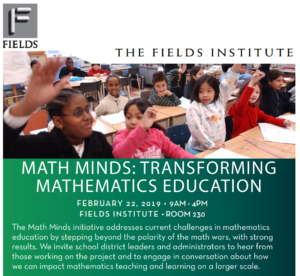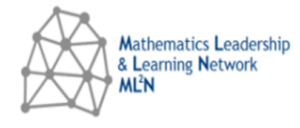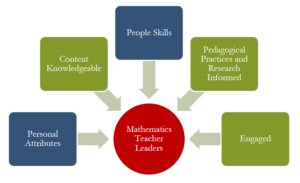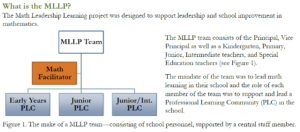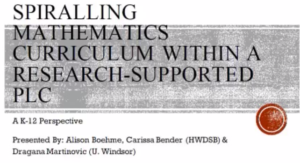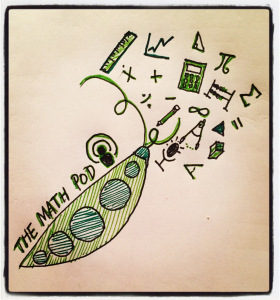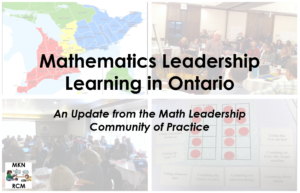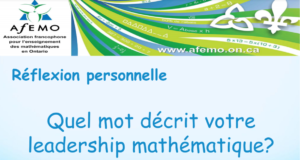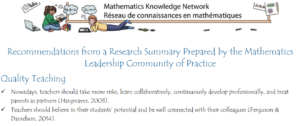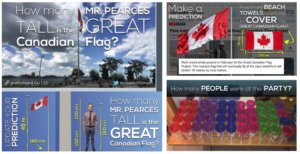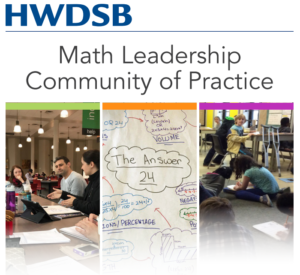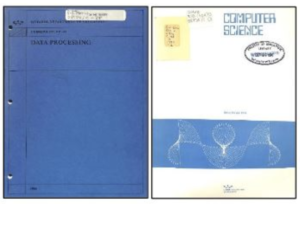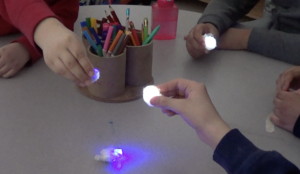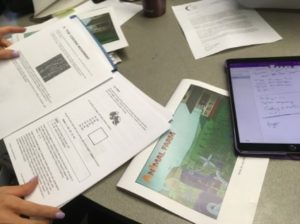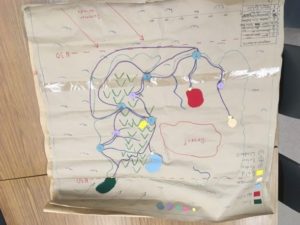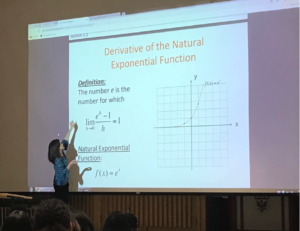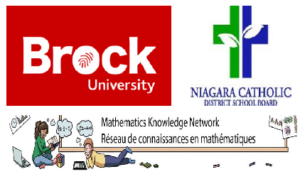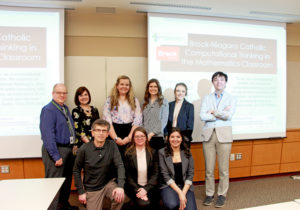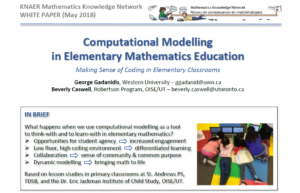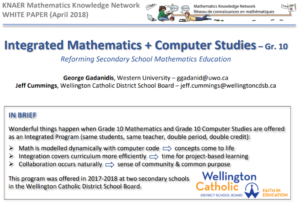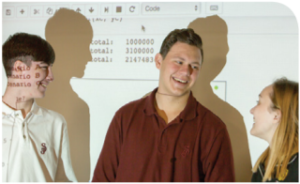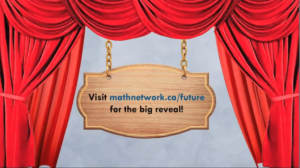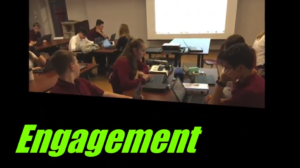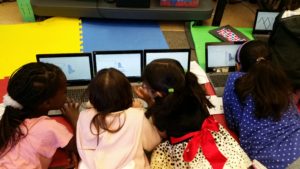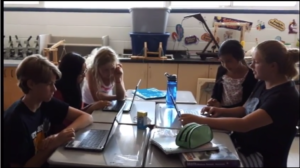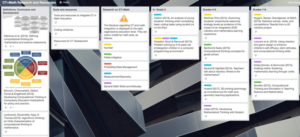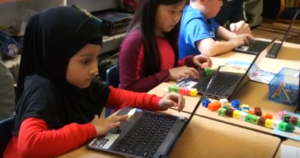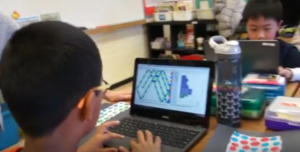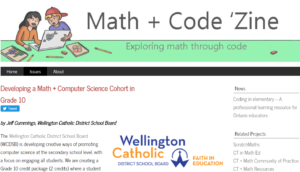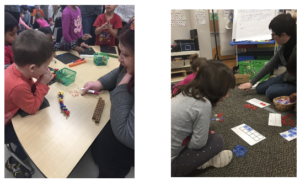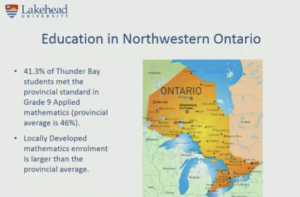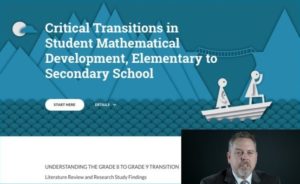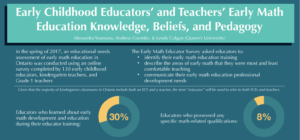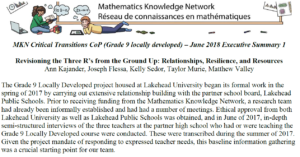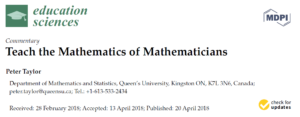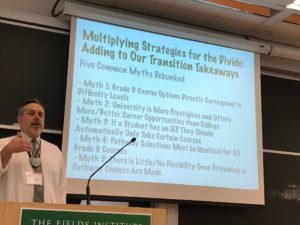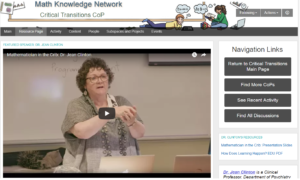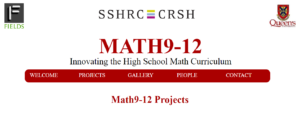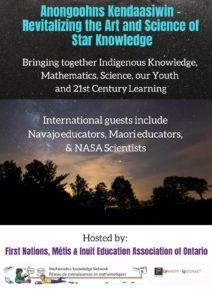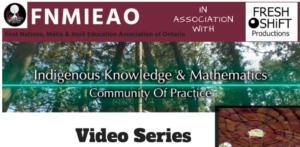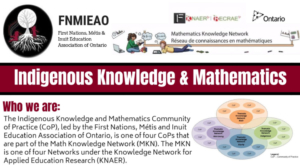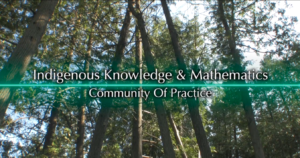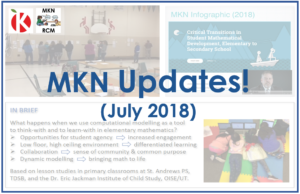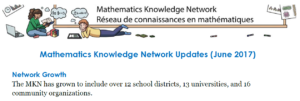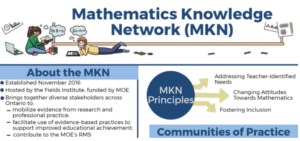COVID-19 Uncertainty Support and Resources
The MKN, through it communities of practice, is offering the following resources and support:
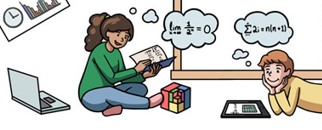 Lesson plans by grade level for Primary, Junior and Intermediate. Some lesson plans were developed from a collaboration between the MKN and London District Catholic School Board.
Lesson plans by grade level for Primary, Junior and Intermediate. Some lesson plans were developed from a collaboration between the MKN and London District Catholic School Board.
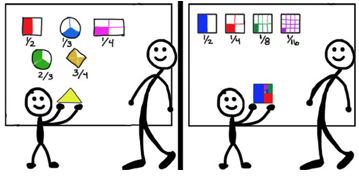 Interdisciplinary Lesson Plans continuing from our usual lesson plans for primary, junior and intermediate, interdisciplinary lessons with a different age group posted every week!
Interdisciplinary Lesson Plans continuing from our usual lesson plans for primary, junior and intermediate, interdisciplinary lessons with a different age group posted every week!- The Early Years Home Math Learning! Developed by: Dr. Sandy Youmans, Edward Schroeter, Melanie Martin and Tara McLean (Queen’s University). The calendars below provide different home-based activities to help your child develop and maintain math skills during the summer. Each week focuses on a new concept.
- Peter Taylor (Queen’s University) and his team are developing HS math activities with wonder, beauty and creativity. See https://www.rabbitmath.ca/

MORE …
Click below to access more resources from our four Communities of Practice!
Mathematics Leadership
Math Leadership CoP Resources
OAME Talks (February 2019). If you missed any you can catch up by listening the podcasts from the provided
links or download them from
iTunes or
Google Play.
Math Leadership: Math Minds: Transforming Mathematics Education (February 2019). Read about the workshop at the Fields Institute,
Math Minds: Transforming Mathematics Education. The goal of this workshop was to inform, reflect upon, and provide opportunities for a robust Math Minds model to be introduced across Ontario learning communities.
December Update from the Mathematics Leadership CoP (December 2018). Read about the three
events in which our partners and members participated since the start of the new school year: OAME Leadership Conference, JUMP Math and Western University Conference, and Ministry of Education professional learning virtual meetings!
Content Leadership in Mathematics Education (November 2018). Read the new
Literature Review and
Recommendations prepared by our Mathematics Leadership CoP research team. Learn about recommendations for teacher leadership, school-based leadership, professional development, and more!
GECDSB’s Mathematics Leadership Learning Project (MLLP) (August 2018). For the project overview, results, and implications for future learning, check out the
report by our Mathematics Leadership CoP & GECDSB.
The Math Pod Cycle 3 Overview (May 2018). Cycle 3 of The Math Pod occurred from April 4-25, 2018. Check out the highlights from Cycle 3 in this
report by our Mathematics Leadership CoP!
The Math Pod Cycle 2 Overview (April 2018). Cycle 2 of The Math Pod occurred from January 17 – February 7, 2018. Check out the
highlights from Cycle 2 in this
report by our Mathematics Leadership Community of Practice!
Spiralling the Mathematics Curriculum within a Research-Supported PLC: A K-12 Perspective (January 2018). Watch the
presentation by Alison Boehme, Carissa Bender (HWDSB), & Dragana Martinovic (University of Windsor) from the Fields MathEd Research Day.
The Math Pod Phase 1 Overview (December 2017). Learn about the success of the first phase of this collaborative open learning opportunity in their
Phase 1 Report (prepared by Dr. Dragana Martinovic and Debbie Donsky for our Math Leadership CoP). Visit
themathpod.ca to learn more, and join them for phase 2 from January 17 – February 7!
Mathematics Leadership Learning in Ontario (December 2017). See the
blog post by Dr. Dragana Martinovic to learn about the latest updates from the Math Leadership CoP.
Leadership systémique (November 2017). Check out our
resources developed by AFEMO for system leaders (
available in French only).
Mathematics Educator Leadership in Ontario: Research Results (September 2017). See the
research report by Dragana Martinovic on behalf of the ML CoP.
Moderating Mathematics: A School-based Professional Learning Model (September 2017). See the
protocol developed by the Program Office of the GECDSB for the ML CoP.
Professional Learning Facilitators’ Guide (September 2017). See the
guide prepared by the GECDSB team for the ML CoP.
Eastwood Whole School Inquiry on Concreteness Fading (August 2017). See the case study
report prepared by Dragana Martinovic and Heidi Horn-Olivito.
Literature Review on Content Leadership in Mathematics (August 2017). Compiled by the Math Leadership Research Team! Get the PDF
here.
Recommendations from a Research Summary (August 2017). Prepared by the Math Leadership CoP. See the recommendations
here.
Canada 150 Math Challenge Report (GECDSB) (August 2017). See the
report prepared by our Math Leadership CoP to learn about math tasks and results of the whole school inquiry.
Strengthening the Mathematics Curriculum: An HWDSB Research-Supported Professional Learning Community (July 2017). See the
2-page summary by Alison Boehme, Grade 5 teacher at Cootes Paradise Elementary.
Recommended Resources
- GECDSB Math Task Force Learning Briefs:
- School Board-University Research Exchange (SURE) network’s “Research to Practice” videos:
Computational Modelling in Mathematics Education
Computational Modelling CoP Resources
Computational modelling initiatives at Wellington CDSB (2019). The Wellington Catholic District School Board has been working to integrate a variety of coding approaches as a way of modelling mathematics concepts and processes, learn about the initiatives
here!
Coding, Mathematics and Historical Ontario Computer Science Curriculum (2019). Steven Floyd discusses how in many educational jurisdictions around the world, coding and computer science (CS) concepts are beginning to extend beyond the high school CS classroom and into other subject areas and divisions; and specifically within the area of K-12 mathematics, coding is being recognized as a valuable context in which to experiment with and learn mathematics. Read the report
here!
Fireflies & Circuits at St. Andrews PS, TDSB (2019). Based on the classroom work of Hager Awara, Iain Brodie, Bal Punia & Bronna Silver – at St Andrews PS, TDSB, read
here about the classroom initiatives Fireflies with Grade 2 Students and their Grade 7 Buddies and Circuits with Grade 7 Students!
Cast a Wide Net at St Andrews PS, TDSB: AI, robotics, coding, math, social studies (December 2018). Students are about to embark on a journey that will take in literature, communication, mathematics, coding, engineering, making, and most importantly – thinking. Read the
report by Iain Brodie to learn what the grade sevens at St. Andrews Public School are about to do with artificial intelligence.
Modelling Civilization at St Andrews PS, TDSB: Coding, Making, Math (December 2018). Even our youngest students are capable of incredible feats of thinking and learning. Read the
report by Iain Brodie to see how grade 3 students model their own civilizations in the classroom
.
Computational Modelling in Tertiary Mathematics Education (October 2018). How does computational thinking affect students’ understanding and experiences in tertiary mathematics? Read the
report by Erin Clements (McMaster University) to see how coding was integrated into an applied calculus course.
Brock U-NCDSB CT + Math Tasks (October 2018). Brock University students worked collaboratively with Niagara Catholic District School Board teachers to develop engaging, coding-based activities for students that were explicitly or implicitly about mathematics. Explore their 4 CM-based math task summaries
here.
Math, art, code (September 2018). This
page includes web links for math + code + art, as well as annotated bibliographies on math + story/poem, math + dance/music, and math + arts theory.
Brock U-Niagara Catholic DSB Computational Modelling Initiative (May 2018). With a focus on experiential learning, five Brock University students worked collaboratively with Niagara Catholic District School Board teachers to develop engaging, coding-based activities for students that were explicitly or implicitly about mathematics. Read the
News Article from Brock University.
Computational Modelling in Elementary Mathematics Education – Making Sense of Coding in Elementary Classrooms (May 2018). Read the
White Paper by CT CoP members, George Gadanidis (Western University) and Beverly Caswell (Robertson Program, OISE/UT).
Integrated Mathematics + Computer Science – Grade 10: Reforming Secondary School Mathematics Education (April 2018). Read the
White Paper by CM CoP members, George Gadanidis (Western University) and Jeff Cummings (Wellington Catholic DSB).
Coding for all: A story of purpose (December 2017). Read the
newsletter from the Wellington Catholic DSB to learn about their innovative math + coding projects.
Back to the Future – Hour of Math + Code (December 2017). Try out our classroom-tested activities and challenges
here.
Wellington CDSB Innovation Project in Math + Coding (November 2017). Offering a course where students learn Grade 10 math but also apply knowledge using Coding environments. Check out the
video overview!
CT CoP Overview (October 2017). See the
slides by George Gadanidis (Western University) and Jeff Cummings (Wellington CDSB) for an overview of Year 1, and plans for Year 2!
Wellington Catholic DSB 2016-2017 Project Overview (October 2017). See the coding documentary
here! See the
blog post by Jeff Cummings for more details.
Literature Review on Computational Thinking and Mathematics (June 2017). See the
current draft by Rosa Cendros, PhD candidate at Western University.
Repeating Patterns + Coding lesson study documentaries (June 2017). See the
lesson study documentaries for Grades 1/2 and Grades 2/3.
Updated Math + Coding documentary on symmetry as a transformation (June 2017). See the
documentary for Grades 2/3.
Wellington Catholic DSB: Developing a Math + Computer Science Cohort in Grade 10 (May 2017). See the article.
Related Projects
- Computational Modelling in Mathematics Education. Researching the use of computational thinking in mathematics education, from pre-school to undergraduate mathematics, and in mathematics teacher education.
- Math + Code ‘Zine. We love math. We love coding. And we love the power of the two combined!
- ScratchMaths (UK). supporting computational and mathematical thinking through programming (Education Endowment Fund)
Recommended Resources
Critical Transitions in Student Mathematical Development
Critical Transitions CoP Resources
Critical Transitions in Mathematics: Early Years Project & Events (2019). The Early Years Project within the Critical Transitions in Mathematics Education Community of Practice has been working on
two major initiatives: (1) The Kindergarten/Grade 1 Learning Trajectories initiative from the Greater Essex County District School Board; and (2) A collaborative inquiry with 8 Kindergarten teachers in the Kawartha Pine Ridge District School Board.
Re-visioning Relationships, Resilience, and Resources (January 2019). Ann Kajander, Taylor Murie, and Kelly Sedor of Lakehead University presented research on the critical transition from Grade 8 to Grade 9 as students pursue either a Grade 9 Locally Developed (LD) mathematics credit or a General Learning Strategies (GLS) credit with a numeracy focus. The presentation can be watched
here and the PowerPoint of the presentation can be accessed
here.
Early Childhood Educators’ and Teachers’ Early Math Education Knowledge, Beliefs, and Pedagogy (September 2018). The results of our Critical Transitions Kindergarten Educator survey are now available. Please share our
summary infographic widely! The full paper will be available in December 2018.
Revisioning the Three R’s from the Ground Up: Relationships, Resilience, and Resources (June 2018). Read the
Technical Report and
Executive Summary to learn about the work happening in Locally Developed Grade 9 classrooms through our Critical Transitions CoP.
Teach the Mathematics of Mathematicians (April 2018). New journal article by Dr. Peter Taylor (Professor at Queen’s University, member of Critical Transitions CoP) in
Education Sciences. Read the paper
here.
Workshop on Crossing the Divide: Exploring Critical Transition Issues from Grade 8-9 Mathematics (March 2018). Held at the Fields Institute; Lead by Dr. Daniel Jarvis, Critical Transitions CoP member and Professor at the Schulich School of Education, Nipissing University. Further details, slides, and presentation recordings available
here.
Critical Transitions CoP Year 1 Overview (October 2017). See the
slides by Dr. Sandy Youmans (Queen’s University) for a full overview of this CoP’s 2016-2017 activities!
Mathematicians in the Crib (August 2017). Presentation by Dr. Jean Clinton (McMaster University) at the Critical Transitions CoP’s Kindergarten Forum for Action. Watch the video, find related resources, and share your thoughts!
Critical Transitions in Student Mathematical Development, Elementary to Secondary School: Literature Review and Research Study Findings (August 2017). See the
report by Daniel Jarvis and Tiberiu Veres.
Math9-12 Project Website (2017). A research-based study designed to bring new life to the high school math curriculum, lead by Dr. Peter Taylor (Queen’s University). Find and try out their resources on the Math9-12 project
website!
Recommended/Related Resources
- Choose a Path that Includes Math! Get to know their online toolkit for Ontario teens and parents who are exploring choices for high school math courses. Visit them at mathpathontario.ca/home.php and check out the video overview.
- Mathematics Learning Trajectories. See the 5-minute video clip with slides by Dr. Douglas Clements, who explains the power and research base of his and Dr. Julie Sarama’s learning trajectories and their new free math web tool (birth to age 8) for educators, parents, curriculum developers, and PD facilitators.
- Development and Research in Early Math Education (DREME) Website. Link: dreme.stanford.edu
- The Robertson Program Website. Inquiry-based Teaching in Mathematics and Science. Link: dreme.stanford.edu
- Mathematics for Young Children Website
- Mathematics for Young Children Literature Review
- Cathy Bruce Publications
Indigenous Knowledge & Mathematics Education
Indigenous Knowledge CoP Resources
The Indigenous Knowledge and Mathematics CoP Workshops (April 2019). The Youth Gathering + Knowledge Sharing Exchange focused on how Indigenous knowledge can inform and enhance the understanding of mathematics, astronomy and our cosmology.
NASA’s Goddard Media Studios worked with the
Indigenous Knowledge and Mathematics CoP to co-create a resource based on Indigenous Knowledge, astronomy, and cosmology with connections to mathematics and the sciences. Learn more about both workshops
here!
IK CoP Video Series (September 2018). The IK CoP released a series of videos that highlight the significance of Indigenous Knowledge in mathematics, provide several examples of Anishinaabe educators, and demonstrate how land-based learning and language help develop spatial reasoning skills. Please share the
Flyer widely, and watch the videos at
bit.ly/IKMATHvideos.
IK CoP Overview Flyer (September 2018). Looking for a quick overview of the Indigenous Knowledge CoP? Check out their
Flyer for who they are, why they exist, and their goals. Please share widely!
Indigenous Knowledge CoP Video Trailer (February 2018). IK CoP plans to further knowledge mobilization by developing a series of videos that showcase their work. See the
trailer on TeachOntario!
More resources coming soon!
To access our general MKN resources, click below.
General MKN Resources
Video Overview of the MKN
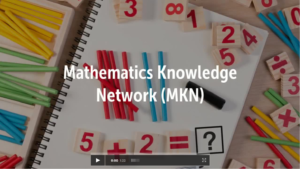
Math Knowledge Network QUARTERLY Issue 1. Read the inaugural issue of the
Math Knowledge Network Quarterly! We are excited to share some of the recent work of our Communities of Practice: Math Leadership, Critical Transitions, Indigenous Knowledge & Computational Modelling.
MKN Updates (October 2018). Read our latest
updates to find out what our CoPs have been up to over the summer, explore recently added resources, & learn how you can get involved.
MKN Updates (July 2018). Updates from the MKN and our Communities of Practice are featured in the 4th Issue of the
KNAERative Quarterly Newsletter. Read the latest news
here.
MKN Updates (April 2018). Updates from our CoPs are included in Issue 3 of the
KNAERative. Check it out
here.
MKN Updates (January 2018). Updates from our CoPs are included in Issue 2 of the
KNAERative. Check it out
here.
MKN Updates (November 2017). Learn about MKN updates in this
2-page summary.
MKN Updates (June 2017). Learn about MKN updates in this
2-page summary.
Want to stay updated? Join our mailing list (right side of page) and/or follow us on Twitter @mknrcm to receive regular updates about new resources, activities, and more!

 Online Seminar Series on Programming in Mathematics Education, co-hosted by Chantal Buteau (Brock University) and George Gadanidis (Western University).
Online Seminar Series on Programming in Mathematics Education, co-hosted by Chantal Buteau (Brock University) and George Gadanidis (Western University).
 Online mathematics education support, in partnership with Ontario Tech STEAM3D Maker Lab
Online mathematics education support, in partnership with Ontario Tech STEAM3D Maker Lab
 Social studies, coding and mathematics integration program, in partnership with the St. James CHS in Wellington CDSB
Social studies, coding and mathematics integration program, in partnership with the St. James CHS in Wellington CDSB Lesson plans by grade level for Primary, Junior and Intermediate. Some lesson plans were developed from a collaboration between the MKN and London District Catholic School Board.
Lesson plans by grade level for Primary, Junior and Intermediate. Some lesson plans were developed from a collaboration between the MKN and London District Catholic School Board.
 Interdisciplinary Lesson Plans continuing from our usual lesson plans for primary, junior and intermediate, interdisciplinary lessons with a different age group posted every week!
Interdisciplinary Lesson Plans continuing from our usual lesson plans for primary, junior and intermediate, interdisciplinary lessons with a different age group posted every week! Indigenous Knowledge
Indigenous Knowledge



